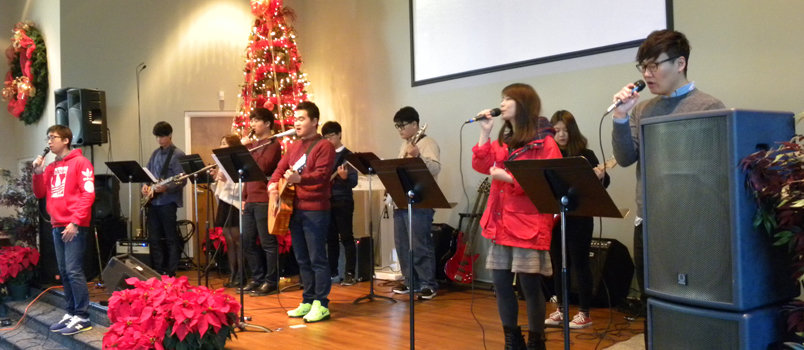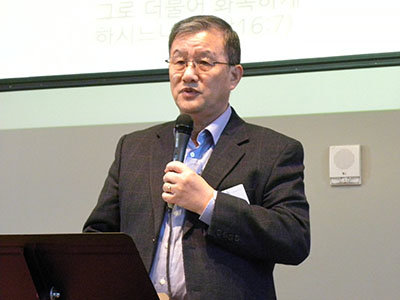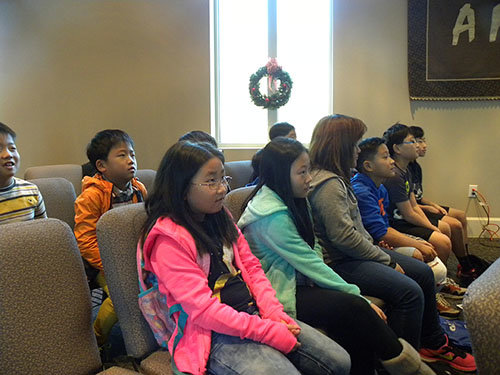 Teens at Se Kwang Baptist Church sing during a worship service Dec. 5 with other Asian American church leaders and students. GERALD HARRIS/Special
Teens at Se Kwang Baptist Church sing during a worship service Dec. 5 with other Asian American church leaders and students. GERALD HARRIS/SpecialSUWANEE — More than 50 Asian American church leaders and youths gathered at Se Kwang Baptist Church on Dec. 5 for Georgia’s first “A2CP2” conference sponsored by local Baptist churches, the Georgia Baptist Convention, and the Executive Committee of the Southern Baptist Convention.
According to Paul Kim, Asian American consultant for the SBC Executive Committee and first speaker for the conference, “A2” stands for “Asian American” and “CP2” stands for “Church Planting/Cooperative Program.
Thirteen youthful Asian Americans consisting of five guitarists, a drummer, three keyboardists, and vocalists provided excellent music leadership for the conference. Jerry Baker, GBC state missionary in Intercultural Church Planting and Missions Ministries, who was engaged in another ministry assignment, greeted those in attendance via video.
Jeremy Sin, a North American Mission Board National Church Planting catalyst working among Chinese and Asian people groups, welcomed the attendees by saying, “I hope this will become the beginning of Asian churches working together more effectively to accomplish God’s purpose in Georgia."
Yong Nam Suh, Intercultural Church Planting and Missions Ministries missionary with the Georgia Baptist Convention, stated that Gwinnett County is the epicenter of ethnicity in Georgia with more than 50% of the population ethnic, mostly immigrants.
Suh indicated that there are 60 Korean Baptist churches in the GBC and more than 300 ethnic Baptist churches in all. He addressed second generation immigrants, emphasizing, “We pray that this meeting will launch the beginning of a greater understanding of who we are as Georgia Baptists and inspire a greater involvement in missions and church planting.”
In Kim’s message he stated, “Some of you were born here in America and some of you were brought here by your parents, but God has a purpose for you and that purpose revolves around following Christ.”
Kim’s message was based on Mark 8:34: “When he had called the crowd with his disciples, he said to them, if anyone would come after me, he must deny himself, take up his cross and follow me.”
“Some of you were born here in America and some of you were brought here by your parents, but God has a purpose for you and that purpose revolves around following Christ.”
He emphasized, “College students want to follow something or someone, but often end up following the wrong thing.
“First, we are to follow Christ by denying self. I have discovered that even in the Christian life people fill their lives with the wrong things. I live in Boston and where I live people are forever talking about the Red Sox or the Patriots. Sports teams dominate their lives. We get distracted from following Christ. What have you denied in order to follow Christ?
“Second, we have been called take up our cross. Following Christ may not be easy. It may mean persecution, even death. Are you willing to die for the cause of Christ?”
Kim not only talks commitment, missions, and church planting, but he has demonstrated that commitment as a pastor and preacher of the Gospel. As pastor of Antioch Baptist Church in Cambridge, MA, he led his church to plant 26 different churches – 13 were planted in the United States and 13 were planted overseas.
 Paul Kim, Asian American consultant for the SBC Executive Committee, explains to those gathered at Se Kwang Baptist Church Dec. 5 the importance of following Christ despite passions that become distractions. GERALD HARRIS/Index
Paul Kim, Asian American consultant for the SBC Executive Committee, explains to those gathered at Se Kwang Baptist Church Dec. 5 the importance of following Christ despite passions that become distractions. GERALD HARRIS/IndexFollowing his message, Kim gave those in attendance a thorough look at what it means to be a Southern Baptist. He referred his audience to go to the Internet to view “A Closer Look” on the sbc.net website. “A Closer Look” gives a six-page synopsis of what Southern Baptists are all about. It is a helpful guide to anyone who wants to know who Southern Baptists are.
Then Kim showed a video, "Forged by Faith," highlighting the history of the Cooperative Program. He showed real passion in regards to orienting the attendees on the lifeline that holds Southern Baptists together and funds the Convention’s missions and ministries.
The video depicted the plight of the southwestern part of our nation prior to the construction of the Hoover Dam. The unpredictable weather in that part of the nation produced either a flood or a drought. It was feast or famine. He explained that before the Cooperative Program societal giving, which characterized the denomination, was unpredictable and ineffective.
Hoover Dam provided for flood control and irrigation. Farmers received a dependable supply of water in Nevada, Arizona, and California. The hydroelectric generators of Hoover Dam suddenly began to produce nearly 1.5 million kilowatts of power.
The creation of the Cooperative Program produced a similar affect by providing a unified effort across the country that solved the feast or famine problem within the Convention. Churches started giving 11% of their receipts through the CP and enabled the denomination to take a giant step forward in Kingdom finance.
 Children listen at the conference. Gwinnett County is the epicenter of ethnicity in Georgia, stated Yong Nam Suh of GBC Intercultural Church Planting and Missions Ministries. GERALD HARRIS/Index
Children listen at the conference. Gwinnett County is the epicenter of ethnicity in Georgia, stated Yong Nam Suh of GBC Intercultural Church Planting and Missions Ministries. GERALD HARRIS/IndexMost of the Convention’s ethnic churches are relatively small, so Kim presented some interesting statistics to illustrate the value of the smaller churches. He explained that in 2013 the churches in the SBC that average over 1,000 in worship attendance gave $85,836,209 to the Cooperative Program, but that churches averaging less than 250 in worship gave $195,966,100 to the CP.
Kim added, “Smaller churches matter. Small churches can become game changers.”
Georgia is becoming a state with an increasing population of people from the far-flung corners of the earth. Georgia Baptists and the Asian American church leaders are focusing on reaching these ethnic groups with the message and love of Christ.